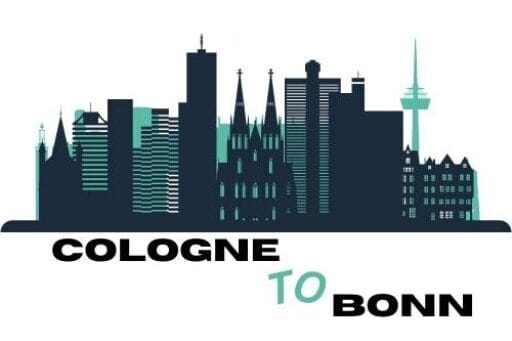Bonn in January: Weather Info & Travel Tips
*Cologne-to-Bonn contains affiliate links and is a member of the Amazon Services LLC Associates Program. If you make a purchase using one of these links, we may receive compensation at no extra cost to you.
WONDERING, WHAT’S THE BEST TIME TO VISIT BONN, GERMANY?
You’ve landed on the right article! I lived in Bonn and I’m going to tell you everything you need to know about visiting Bonn in January.
From the weather in Bonn in January, to the best things to do in Bonn in January and even some Bonn travel tips for January — it’s all here. Ready to discover everything you need to know for your Bonn January trip? Let’s get to it!
Bonn in January: Weather Info & Travel Tips
Weather in Bonn in January
You might be curious about the weather conditions in Bonn during January, especially if you’re planning a trip.
Typically, Bonn experiences cold temperatures ranging from an average low of approximately 1°C (33°F) to an average high of around 6°C (43°F) in January. The city can also be quite damp and cloudy during this period, with an average of roughly 14 rainy days throughout the month.
Overall, January is not the most desirable month weather-wise to visit Bonn.
Average temperatures in Bonn in January
The typical temperature range in Bonn, Germany during January spans from an average low of approximately 1°C (33°F) to an average high of around 6°C (43°F).
Nevertheless, it’s worth mentioning that temperatures can fluctuate day by day and year by year. Hence, it is advisable to refer to a trustworthy weather website or application to obtain the most current weather details.
- Average high temperature in Bonn in January: 39.2°F (4°C)
- Average low temperature in Bonn in January: 31.5°F (-0.3°C)
- What are the hottest months in Bonn Germany? July – August
- What are the coldest months in Bonn Germany? January – February
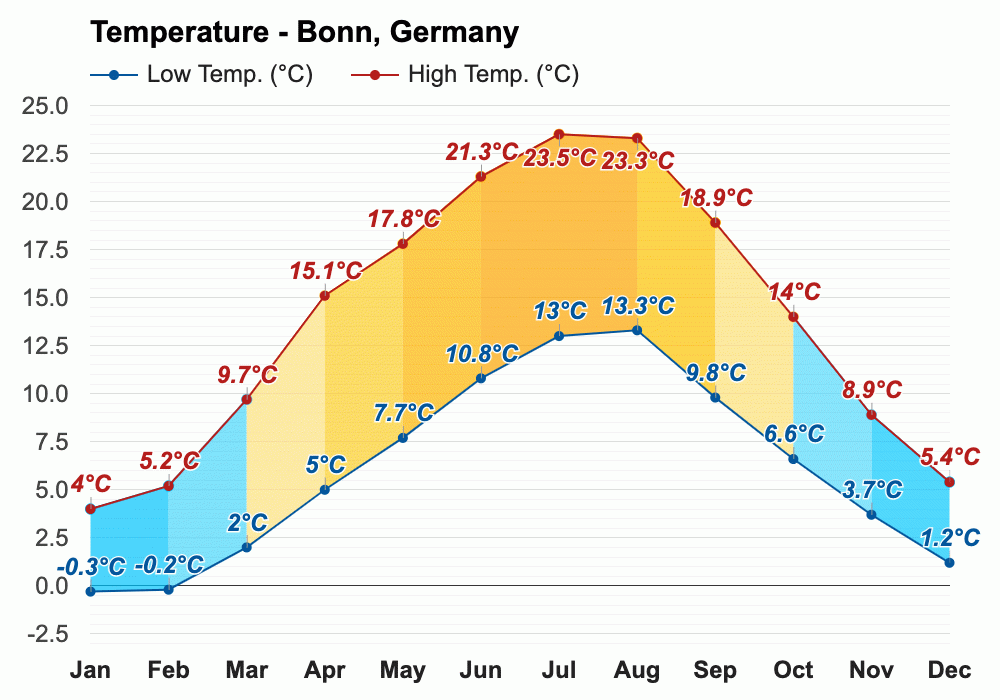
Does it snow in Bonn in January?
Absolutely! Snowfall is frequently observed during the winter season, particularly in the months of December, January, and February in Bonn. The quantity of snowfall can differ significantly from one year to the next.
Normally, there are approximately 6 days with snowfall in January in Bonn, with typically accumulated 25mm (0.98″) of snow. However, the snow doesn’t last long on the ground, instead, it tends to turn into slush rather rapidly.
Is there rain in Bonn in January?
Certainly, there is a certain amount of precipitation in Bonn, Germany during January. The city typically encounters an average of 12.6 rainy days throughout the month, with a total precipitation level of approximately 22mm (0.87 inches).
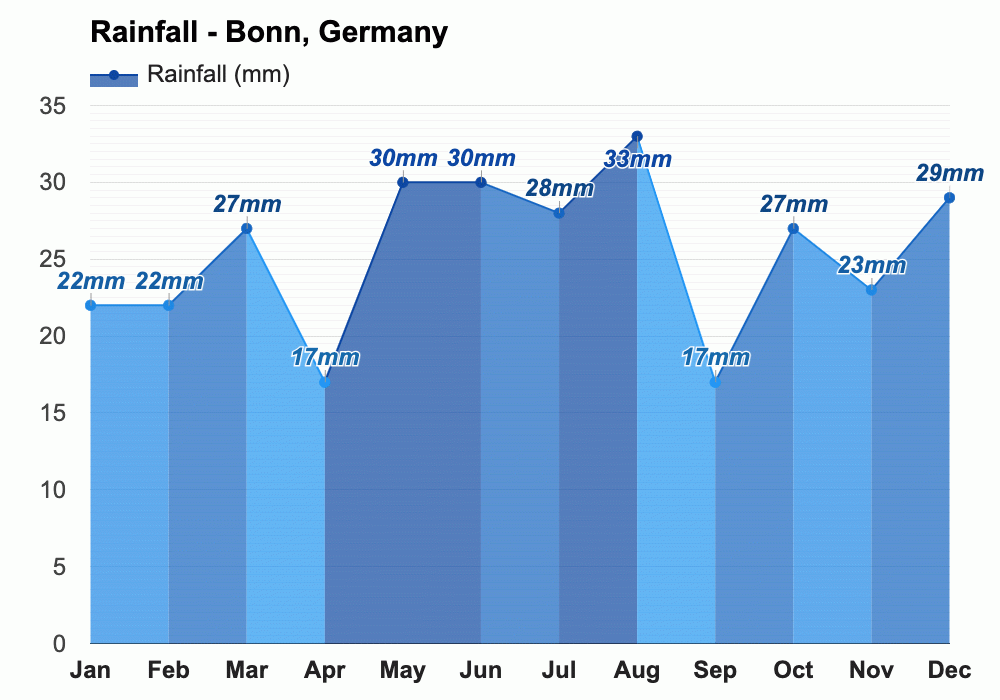
Does it rain all day in Bonn in January?
In Bonn, it is unusual for the rain to last throughout the day in January. However, it is plausible that there may be some instances of continuous rainfall.
Typically, Bonn observes an average of 12.6 rainy days in January, implying that there will be days with intermittent periods of rainfall, as well as days without any rainfall.
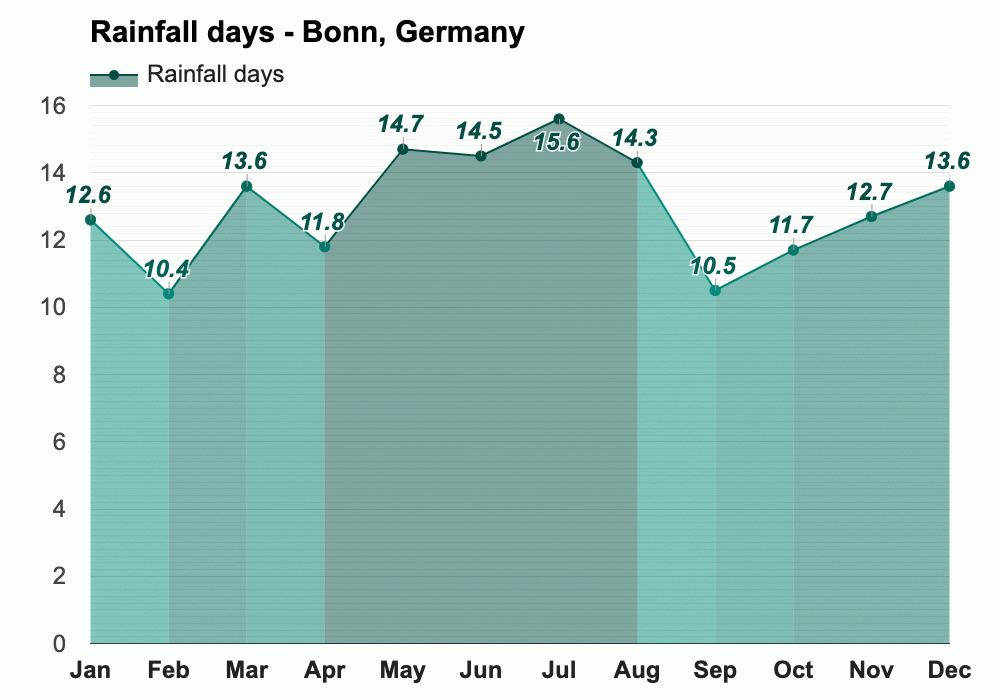
Is there sunshine in Bonn in January?
Certainly, there is a certain amount of sunlight in Bonn during January, but it is often restricted.
On average, Bonn encounters about 4 hours of sunshine per day in January. This can result in a cloudy and overcast atmosphere throughout this month.
Nevertheless, it is essential to acknowledge that there might be some sunny days as well.
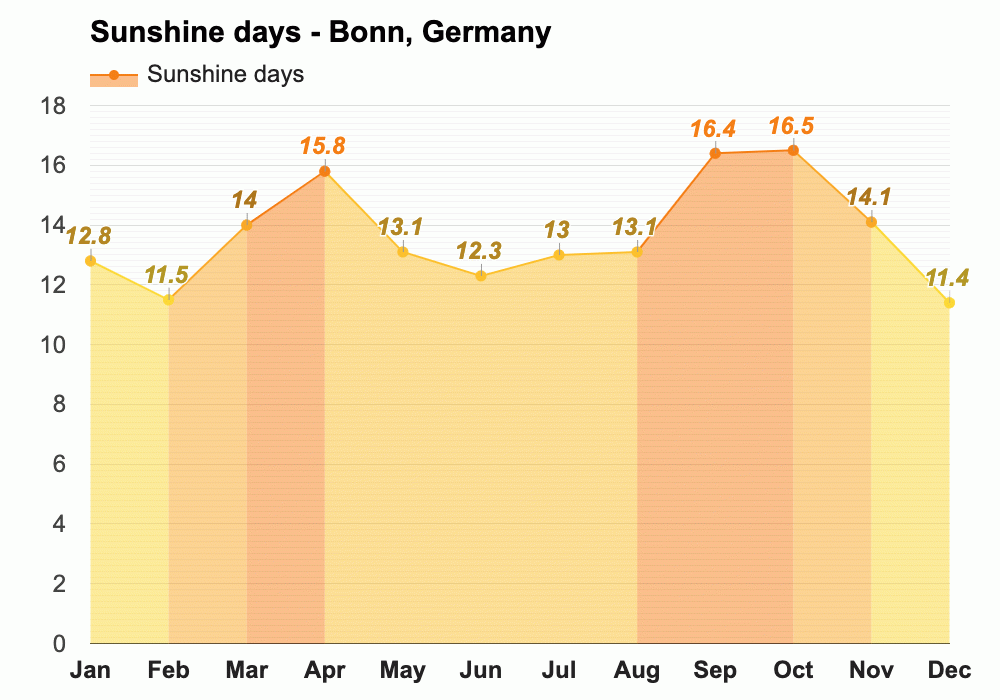
Is it hot in Bonn in January?
Bonn is not hot in January.
In reality, January is one of the chilliest months of the year in Bonn, with an average low temperature of approximately -0.3°C (31.5°F) and an average high temperature of around 4°C (39.2°F).
These temperature ranges are commonly categorized as cold, so if you are planning to visit Bonn in January, it is crucial to dress warmly and be ready for wintery weather circumstances.
Packing for Bonn in January: What to bring?
- Warm clothing: Bring warm and waterproof clothing, including a winter coat, gloves, scarf, hat, and sturdy boots to keep your feet warm and dry.
- Layers: Pack clothing that you can layer, such as sweaters, cardigans, and long-sleeved shirts. This way, you can add or remove layers as needed to stay comfortable.
- Thermal underwear: Consider packing thermal underwear to keep you extra warm, especially if you plan to spend a lot of time outdoors.
- Umbrella: Bring a compact umbrella that can fit easily into your bag, in case of rain or snow.
- Camera: Bonn has many beautiful sights and attractions, so don’t forget to bring your camera to capture your memories.
- Adapter: If you’re traveling from outside of Europe, be sure to bring a power adapter so that you can charge your electronics.
- Portable charger: Bring a portable charger for your phone or other electronic devices, as you may be out and about all day and need to recharge.
- Medications: Bring any necessary medications or supplements, as well as a first-aid kit for emergencies.
- Travel-sized toiletries: Pack travel-sized toiletries to save space in your luggage, including shampoo, conditioner, toothpaste, and lotion.
- Cash and credit cards: Bonn is a city with many shopping and dining options. Make sure you have some euros on hand, as not all places accept credit cards.
- Travel documents: Be sure to bring your passport, travel insurance, and any other necessary travel documents.
- Guidebook or map: Consider bringing a guidebook or map to help you navigate the city and plan your itinerary.
Best Tours in Bonn in January
As it can get quite cold in January, you might not want to explore Bonn on your own. A guided tour can take you quickly to the most noteworthy attractions of the Rhine city and provide you with all the important information you need.
Below you will find the best tours for Bonn that are worth booking for your staying in Bonn in January.
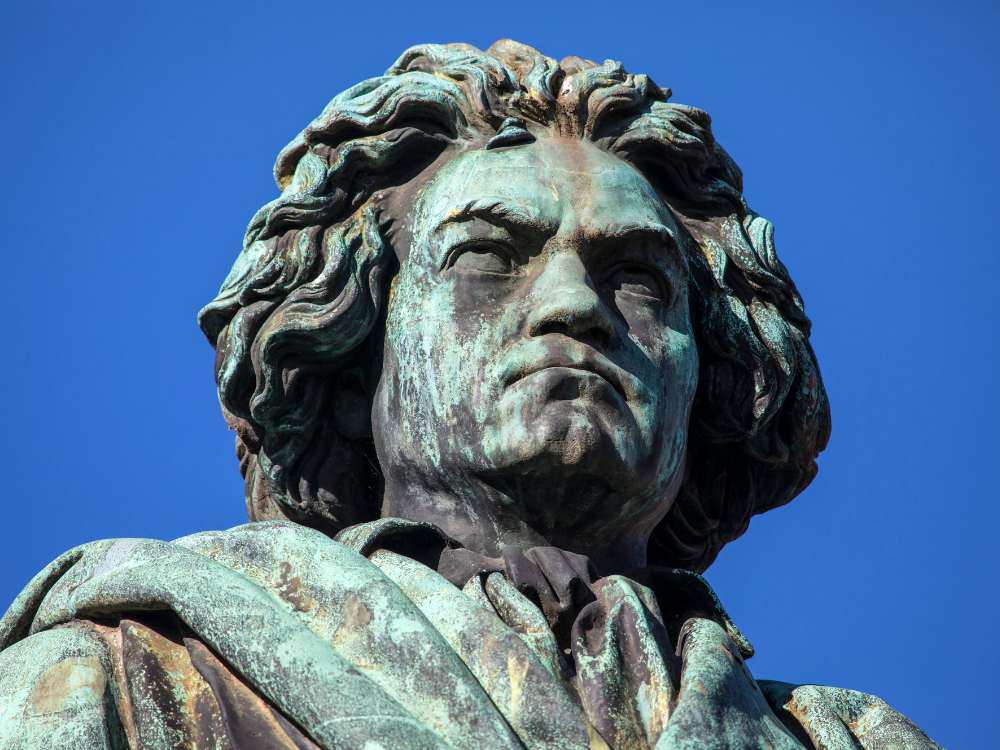
How to get around in Bonn in January?
If you are looking to make the most out of your experience in Bonn, the Bonn Regio WelcomeCard is the ultimate tip. This card allows you to explore not only Bonn but also the surrounding areas while saving money in the process.
With the Bonn Regio WelcomeCard, you can travel for free on public transport and gain free entry or discounted prices to many museums.
So, if you’re looking for a way to make your trip to Bonn budget-friendly, be sure to get your hands on the Bonn Regio WelcomeCard.
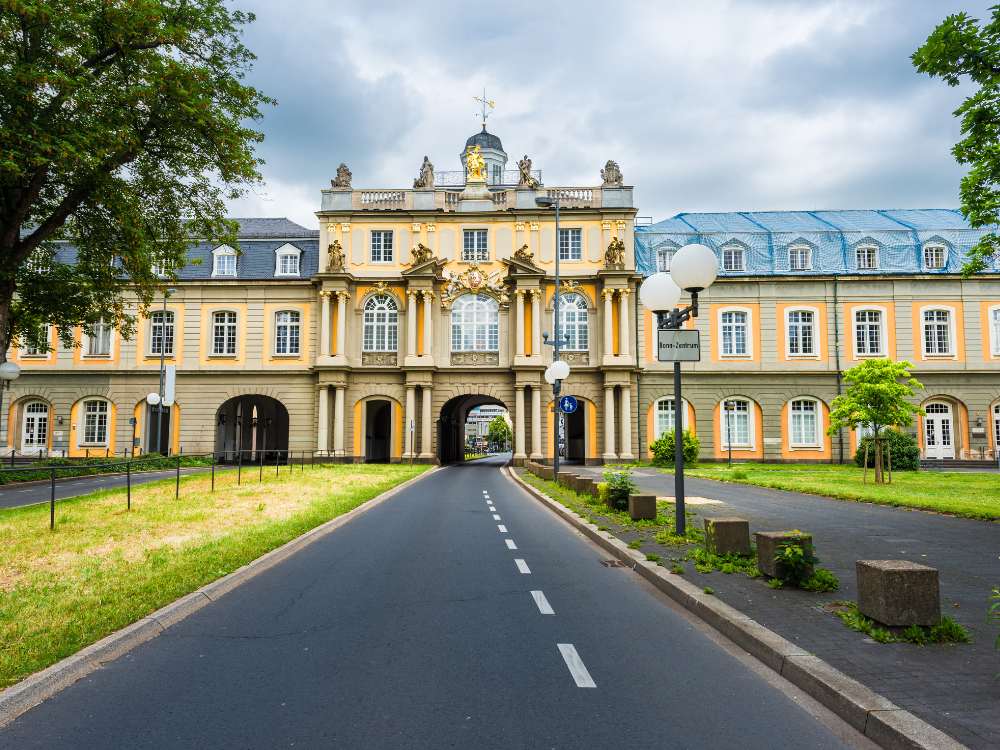
Best Things to do in Bonn in January
There are several things to do in Bonn, despite the cooler temperatures. Here are a few suggestions:
1. Visit Beethoven House
The Beethoven House houses a museum that celebrates the life and accomplishments of the legendary composer Ludwig van Beethoven. It’s situated in the heart of Bonn, in the same building where Beethoven was born in 1770. The museum has a vast collection of artifacts, manuscripts, and personal items belonging to the composer.
When visiting the Beethoven House, you can delve into the composer’s childhood, family life, and musical education. The museum also highlights Beethoven’s artistic progression, presenting his original scores, sketches, letters, and instruments.
The museum’s exhibits are interactive and captivating, giving you the opportunity to listen to Beethoven’s music and learn about his creative process. Furthermore, in addition to the permanent collection, the Beethoven House hosts temporary exhibitions, concerts, and other events throughout the year.
Overall, the Beethoven House is an enthralling and informative tribute to one of the most significant composers of all time.
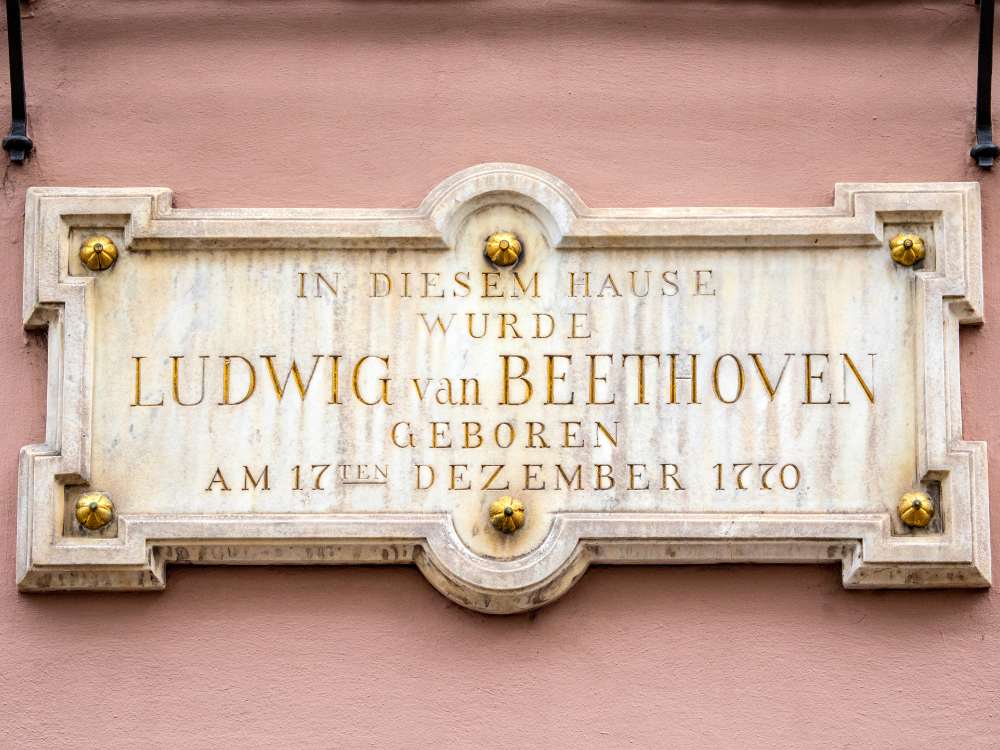
2. Explore German History in the House of the History of the Federal Republic of Germany
The House of the History of the Federal Republic of Germany is an exceptional museum that presents the political and societal evolution of Germany since 1945. The museum’s extensive collection of photographs, documents, films, and artifacts provides valuable insight into the country’s past.
What sets this museum apart is that there is no entry fee, making it accessible to everyone.
You can enjoy guided tours, special exhibitions, and educational programs suitable for all age groups here. The permanent exhibition covers topics such as the division of Germany, the Cold War, and the reunification of the country.
If you are interested in modern German history, a visit to this museum is a must and undoubtedly one of the top things to do in Bonn in January.
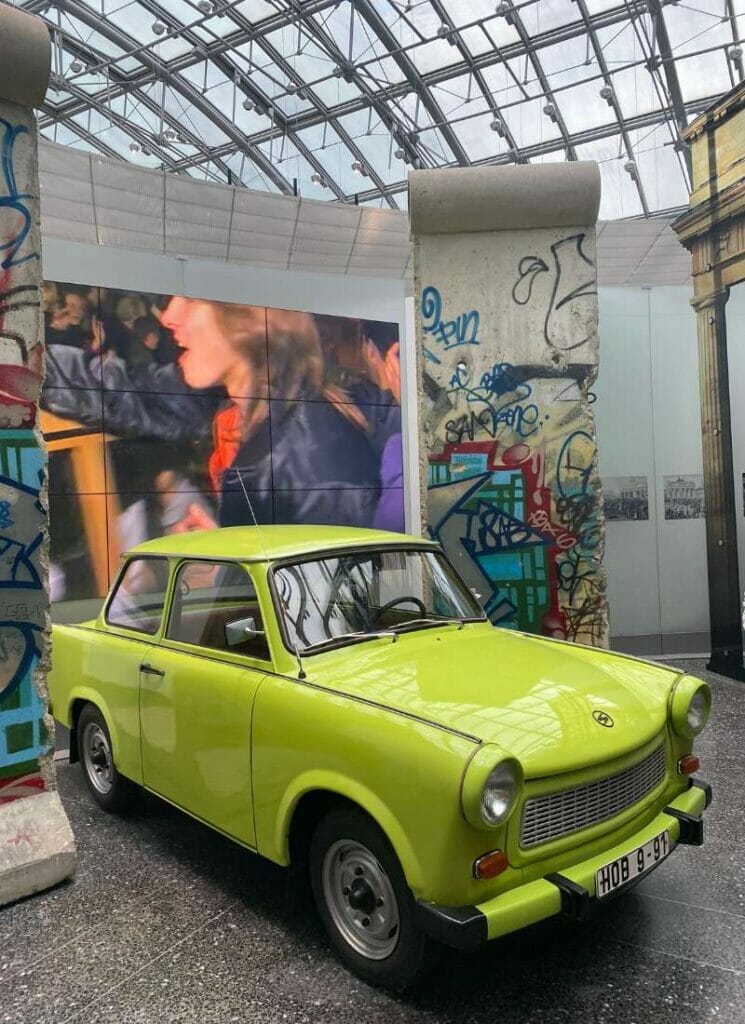
3. Visit Museum König
If you have an interest in science and nature, a visit to the Museum Koenig is a must-do when in Bonn in January. This museum boasts an impressive collection of exhibits that showcase animals, plants, and minerals from across the globe.
Visitors will surely be wowed by the museum’s large collection of dinosaur skeletons, which is one of the museum’s main highlights. Moreover, the Museum König offers interactive displays and exhibits that focus on topics such as biodiversity, ecology, and evolution.
All in all, the Museum König is a fascinating and informative destination that offers an enjoyable experience for individuals of all ages.
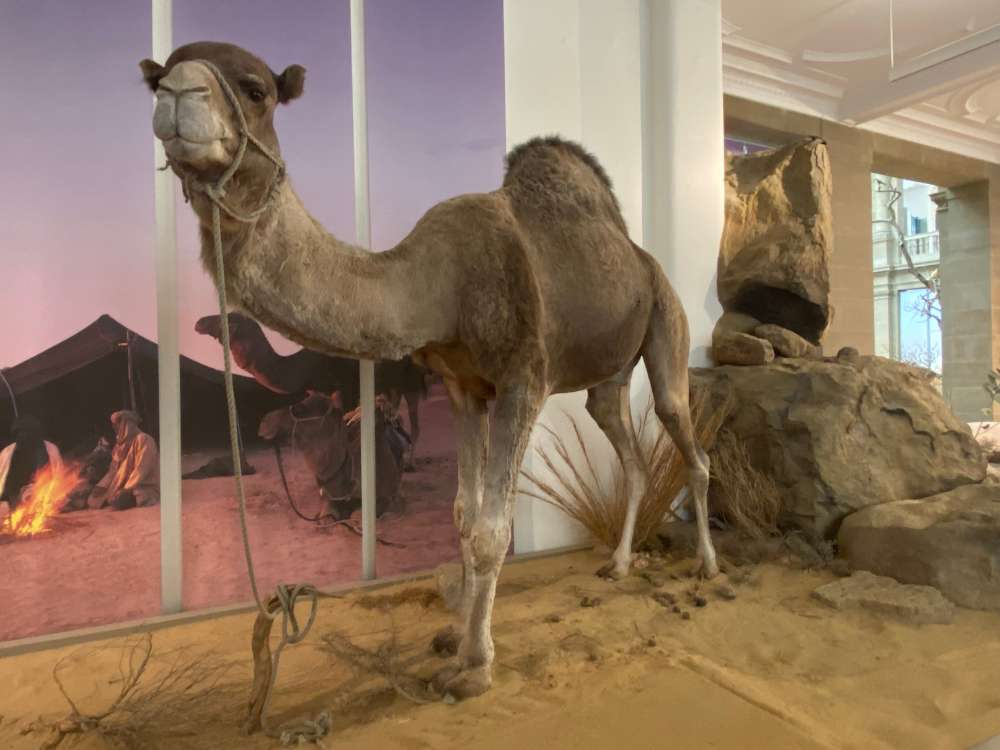
4. Learn about the history of calculation at Arithmeum
If you’re looking for a fascinating indoor activity on a cold and rainy January day in Bonn, the Arithmeum is definitely worth a visit. Located within the University of Bonn, this museum is dedicated to the history and development of calculation and computation.
The Arithmeum boasts an impressive collection of calculators, mechanical and electronic computers, and programming languages. It is showcasing the evolution of computing technology from ancient times to the present day. With interactive exhibits and guided tours, visitors of all ages can explore the inner workings of computers and learn about the role of programming in modern society.
Overall, the Arithmeum offers a unique and engaging experience that is sure to impress visitors with an interest in computing and technology.
5. Visit Art and Exhibition Hall (Bundeskunsthalle)
The Art and Exhibition Hall (Bundeskunsthalle) showcases a variety of exhibits and events throughout the year, making it a must-visit destination for art and culture enthusiasts.
The hall’s exhibitions cover many different art styles and periods, from contemporary art to historical works, featuring paintings, sculptures, installations, and displays on architecture, design, and photography.
The Bundeskunsthalle keeps things fresh and exciting with its regular exhibitions and special events, including concerts. There’s always something new and interesting to see, making it an engaging and dynamic cultural hub.
6. Experience Bonn Museum of Modern Art
Why not experience the world of contemporary art at the Bonn Museum of Modern Art? As one of Germany’s most prominent museums, it offers an extensive collection of German art from 1945 onward, with a particular emphasis on painting and related forms of expression.
The museum’s reputation for presenting a broad range of contemporary art exhibitions, featuring works by world-renowned artists, is well-established. Whether you’re a seasoned art aficionado or just starting your exploration of modern art, the Bonn Museum of Modern Art is sure to inspire and amaze you.
In addition to its stunning permanent collection, the museum regularly hosts temporary exhibitions that showcase the latest trends in the contemporary art world. Don’t miss out on the chance to explore this exciting and dynamic museum!
7. Learn about German Culture at Rheinisches Landesmuseum Bonn
The LVR-LandesMuseum Bonn stands as one of Germany’s oldest and most significant cultural and historical museums. Its vast collection of archaeological and cultural-historical objects tells the story of human history over the course of 400,000 years.
The museum’s focus on the cultural history of the Rhineland is represented by an extensive collection of artifacts, including archaeological finds, medieval artworks, and works from the Düsseldorf School of Painting. The LandesMuseum Bonn also features contemporary positions that showcase the ongoing cultural evolution of the region.
For history and art enthusiasts alike, a visit to the LandesMuseum Bonn is an absolute must.
8. Enjoy sweets at Haribo Factory Outlet
Calling all candy lovers! If you’re in the Bonn area, the Haribo Factory Outlet in Friesdorf is an absolute must-visit.
Here, you’ll find an amazing assortment of Haribo sweets, all at discounted prices. From the classic gummy bears to mouth-watering licorice, the store’s colorful aisles are bursting with sweet treats that will satisfy any sweet tooth.
But that’s not all! The outlet also offers factory seconds, which means you can snag your favorite Haribo candies at even lower prices. It’s the perfect spot for a fun and affordable shopping trip with your friends or family.
Don’t miss out on this one-of-a-kind candy shopping experience – head to the Haribo Factory Outlet in Bonn Friesdorf today!
9. Have fun at Phantasia Land
Phantasia Land is a popular theme park located in Brühl, near Bonn.
The park is well known for its exciting roller coasters, thrilling rides, and immersive themed areas. Visitors can explore the park’s various zones, such as Africa, Mexico, and China, each featuring unique attractions and experiences.
In January, Phantasialand offers a special event called Winter Dream, where the park is transformed into a winter wonderland with festive decorations, live shows, and seasonal treats.
You can enjoy ice skating, snow tubing, and other winter activities in addition to the park’s regular attractions.
If you love the winter season and want to celebrate it in a fun and exciting way, the event offers you a unique experience
Phantasialand is an excellent destination for families and friends looking for a day of adventure and fun. The park is suitable for all ages, with attractions ranging from mild to wild.
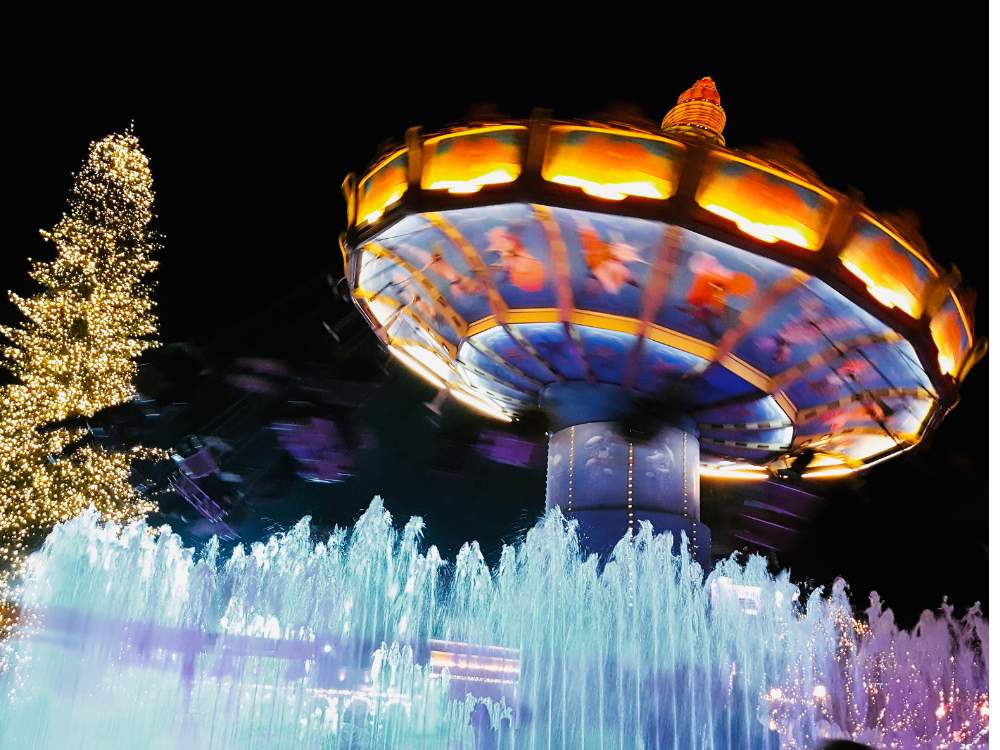
Holidays & Festivals in Bonn in January
Bonn, just like its neighboring city Cologne, only has one public holiday in January: New Year’s Day.
This national holiday, which falls on the 1st of January, is an opportunity for people to celebrate the start of the new year with family and friends. While most businesses, shops, and offices in Bonn are closed, some tourist hotspots such as museums and restaurants might stay open to offer visitors an enjoyable experience.
It’s important to note that public transportation may run on a reduced schedule, so it’s recommended to check the timetables in advance to avoid any inconvenience. Despite this, the city still has plenty to offer for those who want to explore and discover the many sights and sounds Bonn has to offer.
Bonn in January: Travel Guide
Is Bonn good to visit in January?
While Bonn has many attractions that can be enjoyed throughout the year, January may not be the best time to visit the city.
The weather during this time of year can be quite cold, with temperatures often dropping below freezing. Additionally, the city experiences fewer daylight hours during the winter months, with the sun setting as early as 4:30 pm.
However, some travelers may still find January to be an enjoyable time to visit Bonn, especially if they are prepared for the cold weather and plan accordingly. Ultimately, the decision to visit Bonn in January will depend on individual preferences and priorities.
What are the best places to stay in Bonn in January?
If you’re planning to visit Bonn in January, there are numerous accommodation options available to suit a variety of budgets and preferences. From hotels and guesthouses to apartments and hostels, there is something to suit every traveler’s needs.
What is the best time to visit Bonn Germany?
The best time to visit Bonn, Germany, depends on your personal preferences and interests. The city has a temperate climate, with mild temperatures and occasional rainfall throughout the year. The peak tourist season in Bonn is during the summer months of June to August when the weather is warm and sunny, and there are many outdoor events and festivals.
However, spring (March to May) and autumn (September to November) are also excellent times to visit Bonn. During these months, the weather is milder, and there are fewer crowds, making it easier to explore the city’s attractions at your own pace. Plus, in the spring, you can witness the famous cherry blossoms in full bloom, which is a sight to behold.
Winter (December to February) can be quite cold in Bonn, with occasional snowfall. However, if you don’t mind the cold weather, you can take advantage of the quieter season and enjoy the city’s Christmas markets and winter festivities.
Overall, the best time to visit Bonn depends on your interests and preferences. Each season offers something unique to see and experience in this beautiful German city.
Is January a good time to visit Germany?
January can be a good time to visit Germany, but it depends on what you are looking for in your trip. Here are some factors to consider:
Weather: January is typically one of the coldest months of the year in Germany, with temperatures ranging from below freezing to around 5°C (41°F). If you are prepared for cold weather and enjoy winter activities like skiing and snowboarding, this can be a great time to visit. However, if you prefer milder temperatures and outdoor activities that are more comfortable in warmer weather, you may want to consider visiting in a different season.
Crowds: January is generally a less busy time for tourism in Germany compared to the summer months, which means that some popular attractions may be less crowded. However, there are still some events that can draw crowds, such as the Berlin International Film Festival and the Cologne Carnival. If you prefer to avoid crowds, it may be worth checking the schedule of events before planning your trip.
Where to go in January in Germany?
For those who love skiing and winter sports, January is a great time to visit Germany.
Some of the best places to go in Germany during January include the Harz Mountains and the Bavarian Alps, which offer stunning winter scenery and a variety of skiing and snowboarding opportunities.
What is the coldest city in Germany?
The coldest city in Germany is generally considered to be Munich, which is located in the southeast of the country. Munich has a continental climate with cold winters and relatively warm summers, with average temperatures in January ranging from -1 to 4 degrees Celsius (30 to 39 degrees Fahrenheit).
However, there are other regions in Germany that can even be colder in the winter months. The village of Kühnhaide, which is in Saxony, holds the record for the coldest temperature ever recorded in Germany.
On January 24, 1940, the temperature in Kühnhaide dropped to a bone-chilling -37.8 degrees Celsius, making it the coldest recorded temperature in Germany to date. Despite its small size, Kühnhaide has gained notoriety for this extreme weather event.
Frequently Asked Questions
Where is Bonn in Germany?
Bonn is a city located in western Germany, in the state of North Rhine-Westphalia. It is situated on the banks of the Rhine River and is the fourth largest city in Germany by population.
How to get to Bonn Germany?
Bonn is well-connected to other parts of Germany and Europe, and there are several ways to get there. Here are some options:
By Plane: Bonn is served by three major airports: Cologne Bonn Airport, Düsseldorf Airport and Frankfurt Airport.
Cologne Bonn Airport is the closest airport to Bonn, located just 20 kilometers away. From the airport, you can easily reach Bonn by train or taxi. The train station is located directly outside the terminal building, and you can take a regional train to Bonn Hauptbahnhof (the main train station in Bonn) in just over 20 minutes. Taxis are also available outside the terminal, and the ride to Bonn takes approximately 30 minutes.
Düsseldorf Airport is located about 85 kilometers north of Bonn and is well-connected to the city by train, bus, and taxi. The journey takes approximately 1.5 hours and there are several direct train connections daily.
Frankfurt Airport is located about 170 kilometers away from Bonn, but it offers many more international flight options. From the airport, you can take a high-speed train (ICE) to Bonn Hauptbahnhof in approximately 1.5 to 2 hours. Alternatively, you can rent a car or take a taxi, which takes around 2 hours, depending on traffic.
By Train: Bonn has two major train stations: Bonn Hauptbahnhof (Central Station) and Bonn-Bad Godesberg. Bonn Hauptbahnhof is located in the city center and is served by many regional and national trains. Bonn-Bad Godesberg is located in the suburb of Bad Godesberg and is primarily served by regional trains.
The city is well-connected to other parts of Germany and Europe by high-speed trains, including the ICE. You can check schedules and buy tickets online through the German railway company Deutsche Bahn.
By Bus: Several bus companies offer services to Bonn from other German and European cities, including Flixbus and Eurolines. The bus station is located near UN Campus.
By Car: If you’re driving, Bonn is easily accessible via the German autobahn network. However, keep in mind that traffic can be heavy, and parking in the city center can be difficult and expensive.
Is there Uber in Bonn?
Yes, Uber is operating in Bonn.
Initially launched in Berlin in 2013, Uber faced several legal and regulatory challenges before expanding its services across Germany. The company finally launched its basic and premium ride options in Bonn in 2021, and it has since grown its operations in the city with more drivers and riders using the platform.
Despite some opposition from taxi drivers and industry groups, many customers have welcomed the competition and flexibility that Uber offers. For visitors to Bonn, Uber is a convenient and cost-effective mode of transportation, especially for those who are unfamiliar with the local public transportation system or prefer the comfort and privacy of a private ride.
Is Bonn safe for travelers?
Bonn is generally considered a safe city for travelers. The crime rate in Bonn is low compared to other major cities in Germany and Europe, and visitors can usually move around the city without any major safety concerns.
However, as with any city, it’s important to take certain precautions to ensure your safety:
Be aware of your surroundings, especially in crowded areas and public transportation!
Keep an eye on your belongings and avoid carrying large amounts of cash or valuables with you!
Stick to well-lit and busy areas at night, and avoid walking alone in deserted areas!
Be cautious of pickpocketing and other petty theft, especially in crowded areas like tourist attractions and public transportation!
Follow basic traffic rules and be aware of bicycles and trams, which are popular modes of transportation in Cologne!
Overall, Bonn is a welcoming and safe city for travelers, but it’s always a good idea to take basic precautions to ensure your safety and security.
Can you drink tap water in Germany?
Yes, tap water in Germany is generally safe to drink. Germany has strict regulations regarding water quality and treatment, and the vast majority of tap water in the country is of high quality and safe for consumption.
In fact, in many parts of Germany, tap water is considered to be of higher quality than bottled water. It is also much cheaper and more environmentally friendly to drink tap water, as it eliminates the need for single-use plastic bottles.
Overall, drinking tap water in Germany is generally safe and a great way to stay hydrated during your travels.
If Bonn in January isn’t for you….
After reading this, you might not want to visit Bonn in January after all.
If so, check out the articles linked below about visiting Bonn during another month of the year.
- Bonn in February
- Bonn in March
- Bonn in April
- Bonn in May
- Bonn in June
- Bonn in July
- Bonn in August
- Bonn in September
- Bonn in October
- Bonn in November
- Bonn in December
- 23 Best Things to Eat at Cologne Christmas Market [Locals Pick] - 18. October 2023
- 15 Things to Do in Cologne at Christmas - 11. October 2023
- 20 Unusual Things to do in Cologne Germany - 6. September 2023
